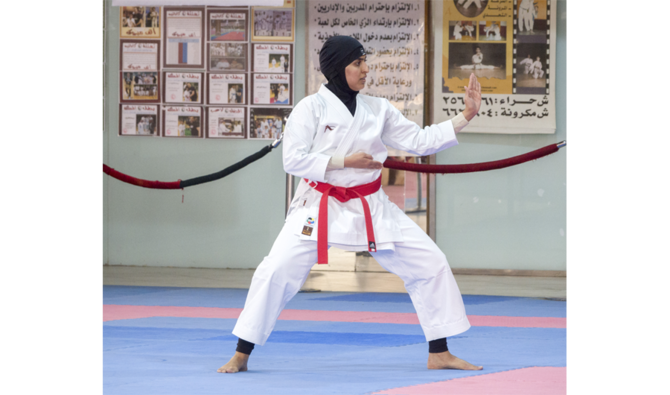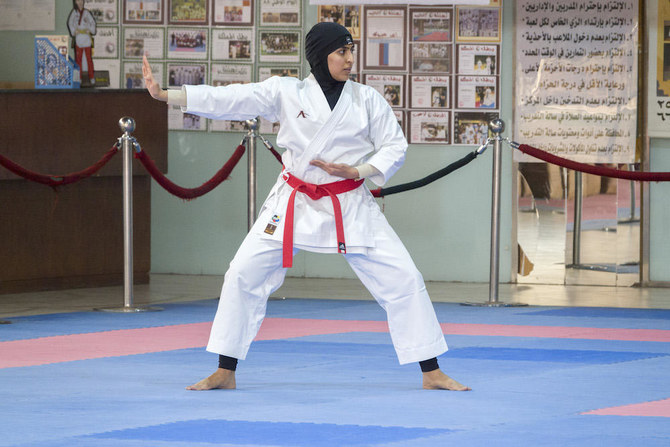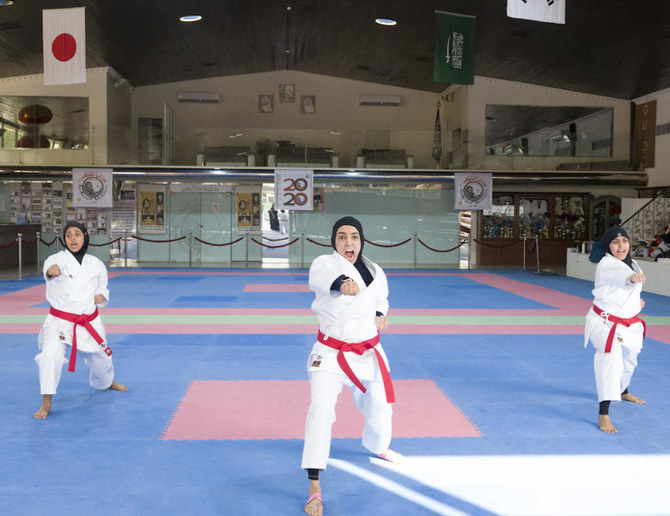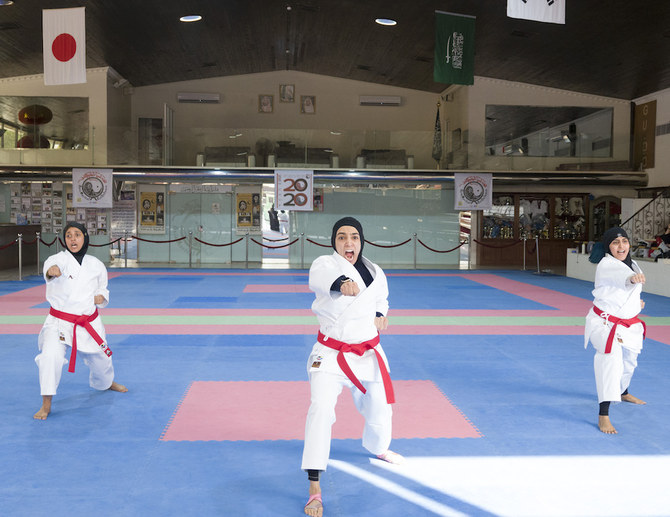JEDDAH: The martial art skills of Saudi women are soon to be on public display. The first appearance of a female Saudi karate team in the fifth Arab Women Sports Tournament, which kicked off on Feb. 2 in Sharjah, in the UAE, will be broadcast on TV.
Four female karate players are representing the Jeddah-based Asia Martial Art Defense Club, with another team from Riyadh also taking part.
“We started our preparations for the tournament nearly two months ago. We have made everything available for the players who will take part in all fighting types,” said Asia Martial Art Defense Club administrator, Ala Al-Sharif, who added that the Saudi Karate Federation has been very helpful.
Saudi karateka Nada Al-Mashat, who works as a psychologist at King Fahd General Hospital, said that her family pushed her to learn karate.
“The wise leadership has made a healthy sports environment available for us and that is the biggest support we have had. The Saudi Karate Federation has also supported our local players of both genders,” she said.
Al-Mashat said the choosing of Prince Sultan bin Salman for a space mission has inspired her and made her sure there is nothing impossible for the Saudi people.
“The prince’s space experience has filled (me) with ambition and determination to do something for my country. I felt like I could make all my dreams come true. I chose karate to take the name of my country to the international level,” Al-Mashat added.
She pointed out that despite her parents’ support, some members of her society did not like to see a female practicing the sport.
“I expected that some people would dislike my decision. That was normal because they had not enough understanding about the importance of sports for women. Karate teaches high values such as self-control, integrity, persistence and respect,” she added.
Al-Mashat said her interest in the Japanese culture has pushed her to learn the Japanese language.
“I was deeply taken by the meaning of the word ‘karate’, which means ‘the empty hand.’ I realized that I would depend on my inner power, not on weapons. The meaning gave me the impression that I would be a weapon and a human at the same time,” she said.
This thought she had when she was young determined her academic development.
“My Master’s thesis was about the influence of martial arts on children with attention deficit hyperactivity disorder. The outcome of the study encouraged me to spread the culture of martial art sports,” she said.
Meanwhile, Sara Hussein Mukhtar, assistant professor at King Abdul Aziz University, said that she started some 14 years ago with a style of karate developed from various martial arts, known as Shotokan. She practiced the sport until she left for Australia, where she started doing the full contact style of Kyokushin, a style of stand-up fighting.
“I got my second black belt and returned to Saudi Arabia, where I started training my own daughter,” she said.
Mukhtar said that the first obstacle she faced was finding a suitable training place for women in Jeddah.
“Another difficulty was trying to convince people that karate, or martial arts in general, does not work against women. It actually helps women to defend themselves, to get self-confidence, self-empowerment and it has so many advantages for women without hurting any of their body systems.”
She said that karate has given her confidence, strength and the feeling of being responsible for spreading the knowledge of Kyokushin karate and this type of sports in Saudi Arabia, where it is not common.
“However, I do not teach karate to women and kids primarily so that they can defend themselves when bullied or attacked. I would first like them to realize that karate is good for their own health. From my specialty, it might help them cope with their own diseases or pathologies as long as they are training in the correct traditional way and under supervision,” Mukhtar said.
In preparation for the tournament, Mukhtar said, they had been training for three to four hours every day.
“We are hopeful that we can achieve something for our country. I have participated in a number of competitions, but this is going to be my first time with a team, and it is really a pleasure. I hope I can do well and make everyone happy,” said Mukhtar, the bronze medal winner at the 10th Arab Kyokushin Karate championship that was held in Tunisia.
The Egyptian coach of the Saudi team, Khaled Anani, said that there is no difference between male and female fighters in regard to training.
“Despite their physiology variations, both male and female athletes are the same since they all are humans. They have the same qualities to go for strong encounters. The Almighty has created man to struggle for life. God has said in the Qur’an: ‘We have certainly created man in the best of stature.’ God meant man not as in males, but as in humans – males and females,” said Anani, who is also a won third place in the Karate World Championship 2013.
Anani added that the only dissimilarity is in the size of the muscle mass.
Another member of the Saudi team participating in the tournament is the head nurse at the King Faisal Specialist Hospital and Research Center, Zainab Al-Ansari.
Her Jordanian husband, Wasim Mazen, is supporting her to make her dreams come true. Mazen was Saudi Arabia’s karate champion from 2002 to 2007.
Al-Ansari said that her father encouraged her to do karate. She started learning the tough sport when she was a child.
“After I left high school, I stopped practicing karate. I focused on my studies and work until I got married to a karate champion who encouraged me to get back to karate,” Al-Ansari said.
She added that she faced some difficulties, but she managed to overcome them.
“The most difficult times we went through were when we had no clubs for females where we could train. This is now changing, and with time everything is hoped to go better and better,” She said.
Al-Ansari urged women in her society to go for a self-defense sport; as it would make them understand themselves much more when they play karate.
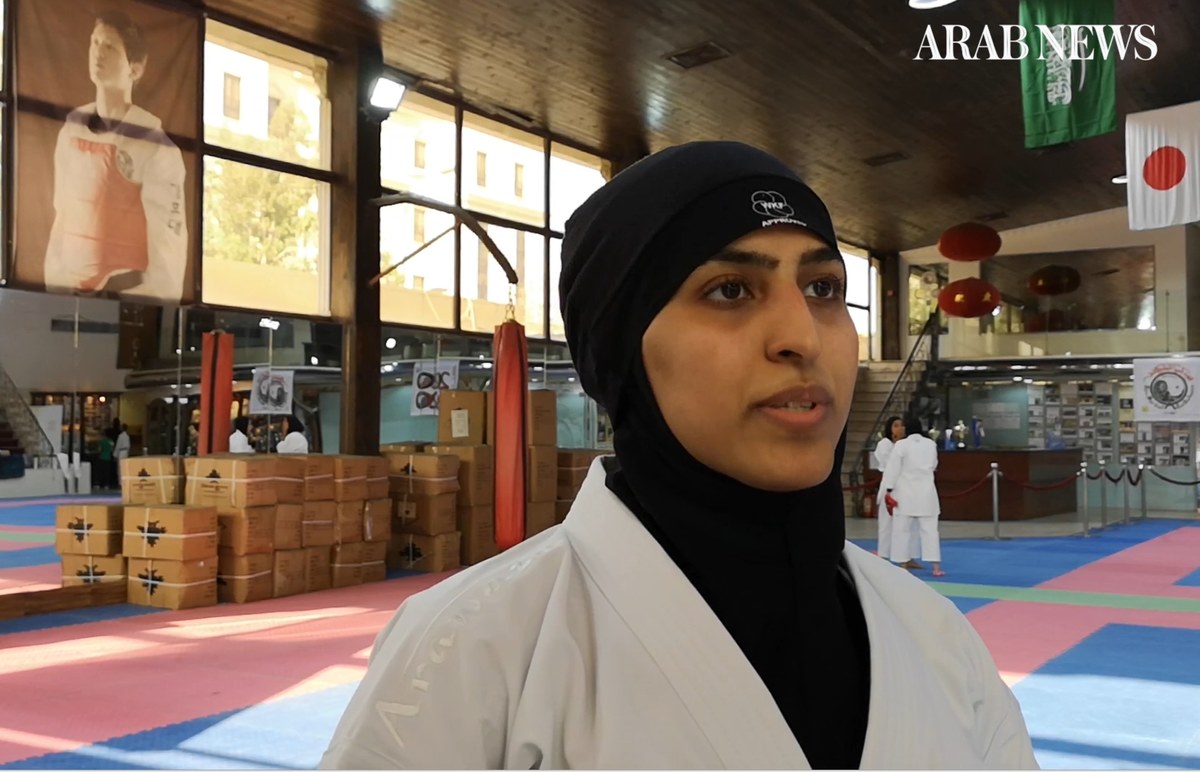
Zainab Al-Ansari, head nurse at King Faisal Specialist Hospital and Research Center in Jeddah, says karate can help practitioners become open-minded.
“No matter whether these females are students or employees, I highly recommend that they learn a self-defense sport like karate,” she said.
She added that karate for women does not mean full freedom the way some people may think.
“Freedom is in the mind. Karate can help them become open-minded. Also, practicing karate is a responsibility, in that its players will become more accountable. This is what karate actually gave me, I feel I am now much more conscious in making decisions and reacting wisely and positively to things around me,” she said.
For his part, Mazen commented that for Saudi women their time had finally come; many of them have started to take advantage of the opportunities provided for them.
“These women can now represent their country in regional and global championships and get the necessary experience they need. They have made qualitative leaps in their performance and they can easily compete in different championships as long as they are keen to learn, improve and invest in themselves,” Mazen said.
He said that their main goal in this competition is to expose the players to the atmosphere of a tournament and to give them the chance to learn from other players who have a wide Olympic experience.
“It is the first time our female players have taken part in such tournaments, and thus our objective is that our players get back to their country with as much knowledge and experience as they can,” he said.



